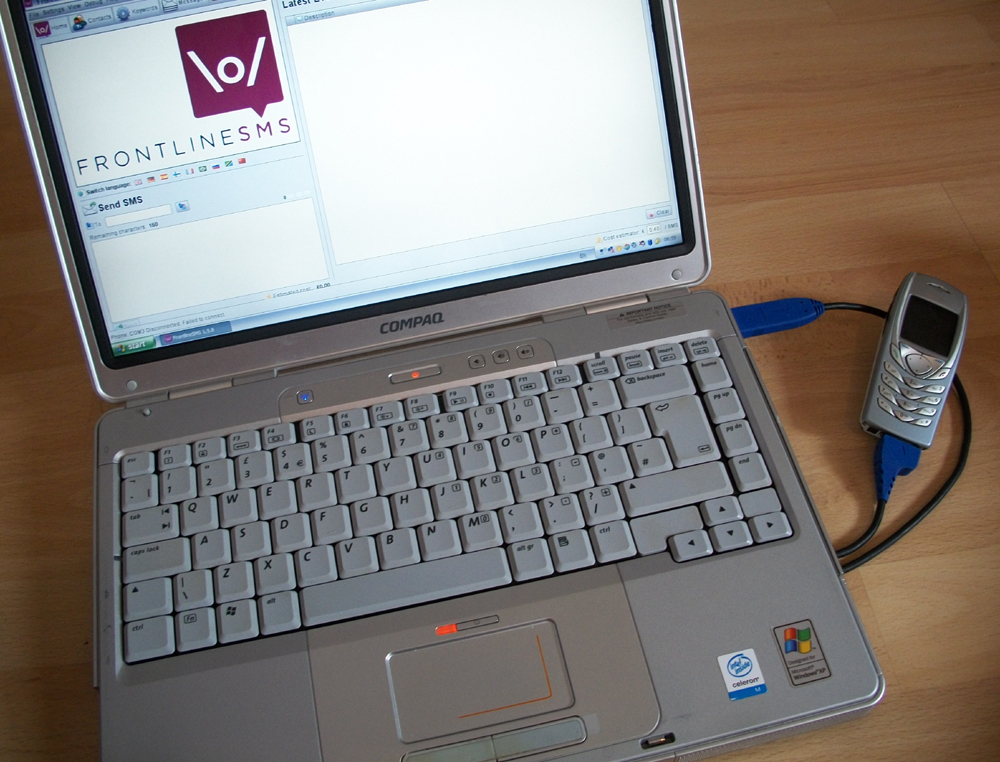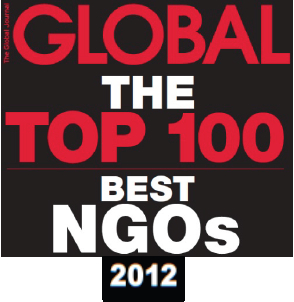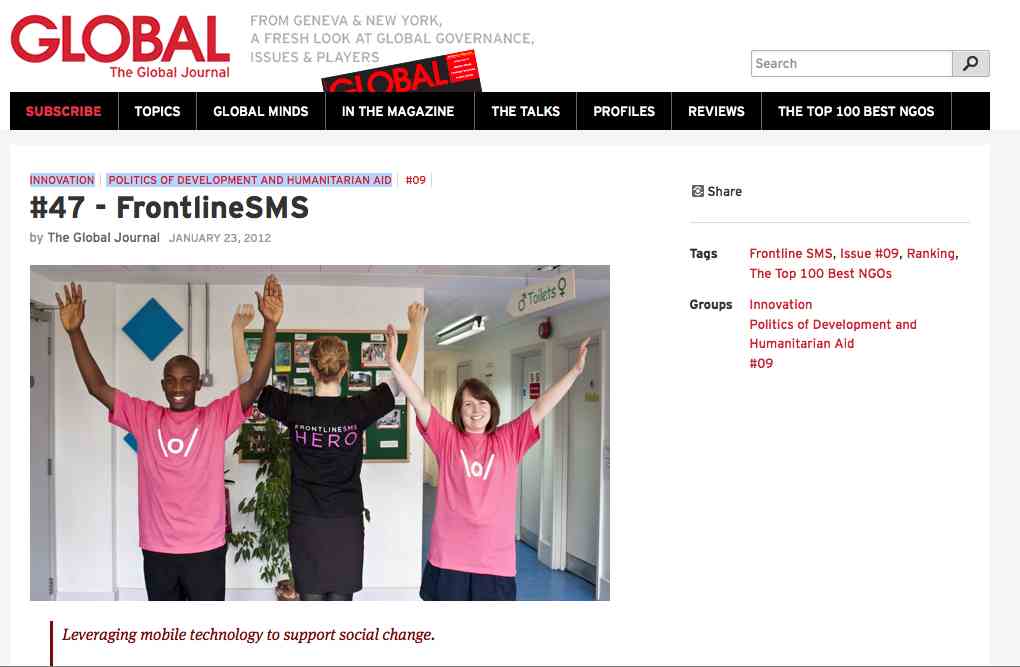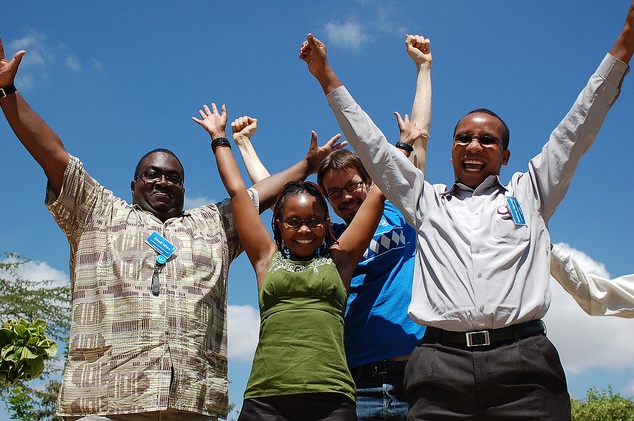This post was originally shared here on Media Shift's Idea Lab blog.
By Flo Scialom, FrontlineSMS Community Support Coordinator
So much can be said in 160 characters. As we've started to look at tailoring FrontlineSMS software for journalists, we've realized just how much potential there is to use text messaging as a news source.
 As FrontlineSMS's community support coordinator, I interact every day with people and organizations that are using SMS in innovative ways. Increasingly, I've come across uses of FrontlineSMS as a journalistic tool, and this is particularly exciting for us as we embark on building new mobile tools to help increase media participation in hard-to-reach communities.
As FrontlineSMS's community support coordinator, I interact every day with people and organizations that are using SMS in innovative ways. Increasingly, I've come across uses of FrontlineSMS as a journalistic tool, and this is particularly exciting for us as we embark on building new mobile tools to help increase media participation in hard-to-reach communities.
FrontlineSMS is a free and open-source tool, so its most interesting uses have always come from motivated, engaged users who discover and experiment with ways to use SMS to improve what they do. When we talk about using SMS for journalism, some people immediately jump into thinking about how they could cram an entire newspaper into 160 characters. Obviously, that would be a bit tight. What our users have found, however, is that there are lots of ways to use shorter communication to enable effective journalism.
In fact, FrontlineSMS users regularly demonstrate how a wealth of information can fit into 160 characters. It's through the creative ingenuity of our users that the impact of using SMS as a news sharing tool really comes to life. The following are some examples of our users that answer the question: What difference can SMS make for the media? Read More
TEXTING INTO RADIO SHOWS
Equal Access is an innovative organization focused on using media and technology to help support development. In Chad and Niger, Equal Access runs interactive community radio shows that feature topics such as politics and religion and discuss how to overcome community tensions. With listeners keen to discuss these topics, Equal Access needs an accessible way to manage regular audience interaction. FrontlineSMS enables users to manage large numbers of incoming and outgoing SMS, providing the ability to view multiple messages on-screen, set up auto-replies, and divide contacts into groups depending on their interests. Using these functions, Equal Access sets up a way for audiences to text into its radio shows, and is able to effectively manage incoming audience text messages while on-air.
The Equal Access team talked about the value of this in a guest post on our blog, saying, "We use FrontlineSMS to create interaction ... and this shows listeners that they are being heard. In closed communities, or those struggling with violence or intolerance, the act of engaging in an interactive dialogue ... can help people feel engaged and included."
Equal Access' use of SMS demonstrates that 160 characters can be enough to enable audience engagement. And it's not just radio audiences that engage in this way (although the combination of radio and SMS is prominent, as seen through our work on FrontlineSMS:Radio).
RAISING AIDS AWARENESS
In the Democratic Republic of Congo, SMS has been used to engage opinions from audiences of a television drama broadcast called "Rien que la Vérité" (meaning "Nothing but the Truth"). One of the aims of this broadcast, which isn't just your standard entertaining drama, is to raise awareness and challenge stereotypes on HIV/AIDS. Viewers of "Rien que la Vérité" were given the option to interact with the show's producers via text message. In this case, hearing from the audience via SMS helped demonstrate whether opinions on HIV/AIDs are being affected by the show's content.
For both Equal Access and "Rien que la Vérité," using FrontlineSMS software enables more efficient audience interaction, making text messages easier to manage, respond to, and analyze.
Ongoing audience interaction is clearly important, and in today's changing media landscape the audience is now a major news provider, too. Even in areas where there's no Internet connection -- where the power of social media has yet to reach -- citizen journalists are still playing a key role in the production of media content.
BREAKING NEWS IN 160 CHARACTERS
Harry Surjadi, a Knight International Journalism fellow, is enabling citizen journalists from remote offline communities in Indonesia to break news in 160 characters. Surjadi has used FrontlineSMS to set up a system in which incoming reports from citizen journalists can be forwarded via SMS to groups of subscribers who would not necessarily have access to news from other sources; the result is a truly innovative and powerful SMS news service which is proving successful already.
The system is run with Ruai Citizen Journalism Training Center, part of a local television station in Indonesia called RuaiTV, and was set up with support from Internews. Surjadi's motivation in setting this system up was to enable remote indigenous communities to actively engage in producing media content, and due to the accessibility of SMS, he is achieving his news-sharing goals.
It's exciting to see how FrontlineSMS is allowing people to engage at a wider community level. Our users have demonstrated the wealth of potential uses of SMS in the media. Through our community, I've seen that 160 characters can speak volumes -- facilitating dialogues, providing a voice to isolated communities, and, ultimately, providing access to information that can help improve lives.
Image courtesy of Ken Banks of kiwanja.net.













